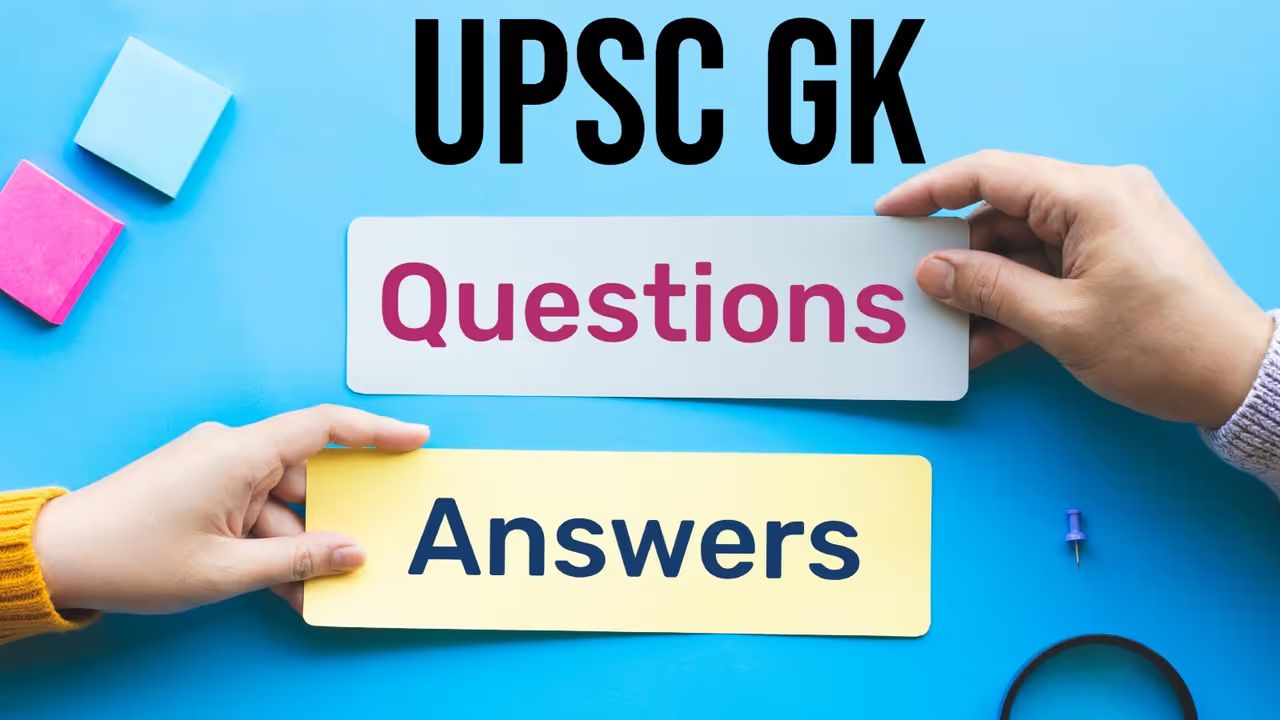Preparing for UPSC? Master Indian Polity with these 30 crucial General Knowledge questions and answers on the Indian Constitution, Parliament, Fundamental Rights, and more. Boost your UPSC exam preparation now!
UPSC GK Questions and Answers: Preparing for competitive government exams like UPSC and SSC requires a strong understanding of Political Science. For UPSC, both Prelims and Mains feature questions on Indian Constitution, Parliament, Fundamental Rights, Electoral System, and Judiciary. We've compiled 30 important Political Science questions and answers based on previous exam trends. These will not only strengthen your general knowledge but also help you score well in the exam.

Political Science Top 30 GK Questions for UPSC
Question 1. When was the Indian Constitution enacted?
Answer: 26th January 1950
Question 2. What type of constitution does India have?
Answer: Written, Federal, and Parliamentary
Question 3. Who was the President of the Constituent Assembly?
Answer: Dr. Rajendra Prasad
Question 4. In which article of the Constitution is the definition of 'State' given?
Answer: Article 12
Question 5. In which part are the Directive Principles of State Policy (DPSP) located?
Answer: Part IV (Articles 36 to 51)
Question 6. Who elects the President of India?
Answer: Electoral College (MPs and MLAs)
Question 7. What does Article 32 relate to?
Answer: Right to Constitutional Remedies for the enforcement of Fundamental Rights
Question 8. How many houses are there in the Indian Parliament?
Answer: Two (Lok Sabha and Rajya Sabha)
Question 9. For how many years are members of the Rajya Sabha elected?
Answer: 6 years
Question 10. What type of democracy does India have?
Answer: Representative and Parliamentary Democracy
Question 11. How many types of governments are there in the Indian Union?
Answer: Three - Central, State, and Local
Question 12. Which constitutional amendment implemented the Panchayati Raj system?
Answer: 73rd Amendment, 1992
Question 13. Who is the current Chief Election Commissioner of India?
Answer: Gyanesh Kumar (assumed office as the 26th Chief Election Commissioner of India on 19 February 2025)
Question 14. Who appoints the Prime Minister of India?
Answer: The President
Question 15. Who is the constitutional head of India?
Answer: The President
Question 16. Who was the first Speaker of the Lok Sabha?
Answer: G. V. Mavalankar
Question 17. Which state was Article 370 related to?
Answer: Jammu and Kashmir (now revoked)
Question 18. How many schedules are there in the Constitution?
Answer: 12 Schedules
Question 19. What type of judiciary does India have?
Answer: Integrated and Independent
Question 20. How many words are there in the Preamble of the Indian Constitution?
Answer: 85 words
Question 21. From which country was the Federal system adopted?
Answer: Canada
Question 22. From which country did India draw inspiration for Fundamental Rights?
Answer: The United States of America
Question 23. Which articles of the Constitution deal with the provisions for Emergency?
Answer: Articles 352, 356, and 360
Question 24. Which right is related to Article 21?
Answer: Right to Life and Personal Liberty
Question 25. Who convenes the joint session of Parliament?
Answer: The President
Question 26. Who was the first non-Congress Prime Minister of India?
Answer: Morarji Desai
Question 27. Who registers political parties in India?
Answer: The Election Commission
Question 28. In which part of the Constitution is the term 'Social Justice' mentioned?
Answer: Preamble and Directive Principles of State Policy
Question 29. What does Article 368 relate to?
Answer: Amendment of the Constitution
Question 30. How long did it take to frame the Constitution?
Answer: 2 years, 11 months, and 18 days


